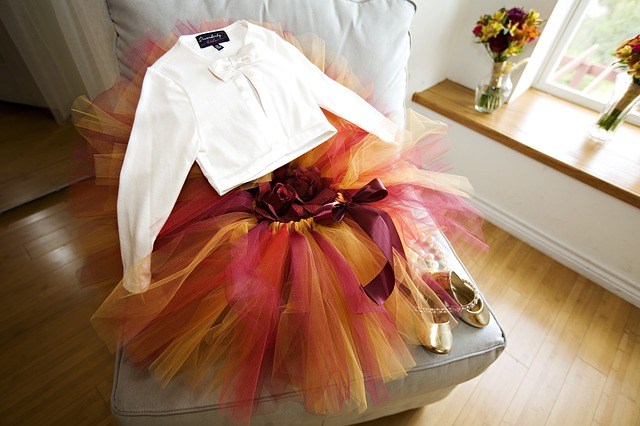Wondering how to make a tutu?
Tutus will always be associated with princesses, ballet, and flouncy clothing that makes you feel happy.
Making your own tutu isn’t hard, and can serve as a wonderful gift to a daughter, niece, or for yourself (no judgment, especially if there’s an abundance of glitter!)
Whether you’re a ballerina seeking to customize your artistic wardrobe or your child who wants to throw the best princess party ever, a handmade tutu is sure to be the subject of admiration.
Above all else, making your own tutu provides a wealth of creative options: use unusual colors, add glitter or other decorations. Go for the extra flounce or stay within convention.
Ready to get started?
All you need is a bit of time and a few ingredients…
What Will You Need To Make a Tutu?

The main materials for crafting a tutu skirt are easy to gather and cheap to buy.
You’ll have most of these items currently lying around the house.
- Scissors.
- A piece of cardboard, as long as your desired skirt length.
- 2 – 4 spools of tulle (depending on the length and volume of your dress).
- A few ribbons.
- Elastic (an average-length bundle as you’ll find at a craft store).
If you have some craft glitter, small pearls, or felt lying around, you can craft additional decorations to liven up your skirt.
How to Make a Tutu Skirt
Making a tutu skirt, despite the appearance, is a simple task.
If it’s designed for a small child or teen, they can easily help with the process.

Prep
First, wind a spool of tulle around the cardboard. Then cut both ends, so the results are a few uniformly sized strips.
Even skirts of medium volume should use at least 80 strips, as the fabric is thin and may also rip, requiring extra pieces to fix.
Once you have your strips, proceed to the next step. Take one of your ribbons and place it on a table. If you would like a better overview while you work, attach tape to each end of the ribbon.
Assembly
With the preparation handled, you can now begin assembling your skirt.
Slipknots are the easiest to use and will give you solid control over how fluffed-up your final creation will be.
You can make a slipknot by folding a tulle ribbon in half. Place the top-end underneath the ribbon, and pull the ends through the loop. Do this over the length of the ribbon until you have enough coverage.
If you desire more volume, you can use additional tulle ribbons in the knot. Make sure to slide the knots against each other to avoid gaps in your skirt. Pulling the knots tight prevents your waistline from getting bumpy.
Once you’re done, you can further decorate your skirt. Glitter, decorative bows, and small pearls are always a big win, so use light glue to apply them.
How to Make a Tutu Dress
Once you know how to make a tutu skirt, making a tutu dress is hardly any work at all. All that’s left is to create a bodice.
Sizing
First, you’ll want to measure the waistline and subtract two inches or five centimeters to make a well-fitting synch.
Do the same just below the armpits, as this is where the top of the dress sits.
Once you’ve completed this, cut your elastic cord to size and sew the ends together to create a circle.
Prepare the tulle strips as you would for a skirt, but add an inch or two to make up for the bodice you’re creating.
Fashioning the Material
Use a model doll or improvise for the last step. Place the top elastic and the waistline elastic apart from each other for about the length of the torso.
First, attach the strips of tulle to the upper elastic, using the previously mentioned slip knot. After this, tie the tulle strip around the waistline.
Repeat until you’ve gone around the circle and have created good coverage.

Final Finish
Once you’ve finished, you can tie a colorful ribbon around the two elastics. This will improve durability and give a more polished look to the final product.
If desired, sew straps to the top of the dress to prevent sliding. Ambitious seamstresses can also opt for creating their own cloth bodices, hot gluing a finished tutu skirt to these.
Tulle Bodice or Cloth – Which is Best?
The tutu dress described in this tutorial is best suited for younger children, while one with a cloth bodice is better suited for teens or adults, as it will be more durable and feel better secured.
There are endless ways to decorate your tutus, from using rhinestones to varying the color of the tulle itself.
Go wild with a decorative fabric, or keep things pretty in pink for an at-home ballet performance. Since they’re so easy to make, extras can be developed on a whim!
Here’s a video showing a tutu prom dress with lace.
For more inspiration: How to sew a dress, how to make your own clothes, and 20 different types of dresses.
Do you have tips for making a tutu?
